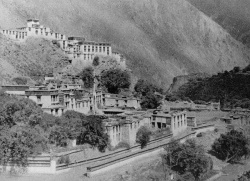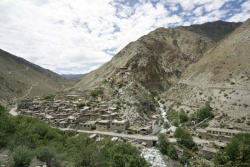Difference between revisions of "Druk Sangag Choeling"
(Created page with " <poem> Druk Sangag Choeling (The Dharma Garden of the Drukpa's Secret Mantrayana) is one of the thirteen 'Ling', founded by Kunkhyen Pema Karpo (1527-, the F...") |
|||
| Line 1: | Line 1: | ||
| − | + | [[File:Sangag_choeling.jpg |thumb|250px|]][[File:Sangag_choeling_2006.jpg|thumb|250px|]] | |
<poem> | <poem> | ||
| − | [[Druk]] | + | [[Druk Sangag Choeling]] (The [[Dharma Garden of the Drukpa's Secret Mantrayana]]) is one of the thirteen 'Ling', founded by [[Kunkhyen Pema Karpo]] (1527-, the [[Fourth Gyalwang Drukpa]]. Following the {{Wiki|prophecy}} of his [[deity]], [[Kunkhyen Pema Karpo]] founded [[Druk Sangag Choeling]] [[monastery]] in the sixteenth century, at Bei-ling, in Jayul province of southern [[Tibet]]. Later, the whole region came to be called [[Sangag Choeling]], adopting the [[name]] of the [[monastery]]. |
| − | Gradually, it became the main seat of the [[Gyalwang Drukpa]] aside from [[Namdruk]], [[Ralung]] and [[Longdol]]. [[Mountains]] on four sides, with meadows in the valleys and forests at the base, surround the whole region. In {{Wiki|ancient}} times this region was part of the {{Wiki|kingdom}} of the [[Chogyal | + | Gradually, it became the main seat of the [[Gyalwang Drukpa]] aside from [[Namdruk]], [[Ralung]] and [[Longdol]]. [[Mountains]] on four sides, with meadows in the valleys and forests at the base, surround the whole region. In {{Wiki|ancient}} times this region was part of the {{Wiki|kingdom}} of the [[Chogyal Japa]] of Jayul. According to legend, this region was part of the {{Wiki|kingdom}} of [[King]] [[Shingthri]] of [[Lhomon]], who was defeated by [[Gesar of Ling]]. There are many ruins that are believed to be the fortresses of ministers of [[King]] [[Shingthri]]. There are many [[sacred]] places in [[Sangag Choeling]]. On the rocky face of the hill at the back, appearing like the pointed cap worn by [[Buddhist]] [[scholars]], is the clear shape of a gate. It is believed that [[treasure teachings]] are hidden here, to be retrieved by a [[reincarnation]] of the [[Gyalwang Drukpa]]. |
| − | [[Mipham | + | [[Mipham Chokyi Nangwa]] (1768 - 1822), the [[eighth Gyalwang Drukpa]], expanded the lower [[temple]] of [[Druk Sangag Choeling]] and built the [[Drolma]] [[Lhakhang]] that housed the famous {{Wiki|speaking}} [[Tara]] images of the white and [[green Tara]], as well as the mausoleum of several [[Gyalwang]] [[Drukpas]]. The [[Lhamo Khang]] housed the [[sacred]] image of [[Palden Lhamo Dudsolma]], the main [[deity]] of [[Naropa]] and many other [[Dharmapalas]]. [[Mipham Chokyi Gyatsho]] (1823 - 1883), the ninth [[Gyalwang Drukpa]], expanded the main [[temple]]. The tenth [[Gyalwang Drukpa]], [[Mipham Chokyi Wangpo]] (1884 - 1930), built [[Lama]] [[Lhakhang]], [[Tshengyed Lhakhang]] and the [[shrines]] of [[Gyalpo Pehar]]. He also rebuilt the upper and lower private residences and the upper and lower houses for the [[monks]]. |
| − | H.E. the late [[Thuksey Rinpoche]] (1916 - 1983) had established a liturgical school for the [[monks]], with 30 students at Sangag Choeling. | + | H.E. the late [[Thuksey Rinpoche]] (1916 - 1983) had established a liturgical school for the [[monks]], with 30 students at [[Sangag Choeling]]. |
| − | The original [[monastic]] structure, along with the [[statues]] and [[scriptures]], was destroyed during the {{Wiki|Cultural Revolution}} in the mid-1960s. After the liberalization in the 1980's the [[monastery]] was partially rebuilt, under my instructions and the supervision of H.E. | + | The original [[monastic]] structure, along with the [[statues]] and [[scriptures]], was destroyed during the {{Wiki|Cultural Revolution}} in the mid-1960s. After the liberalization in the 1980's the [[monastery]] was partially rebuilt, under my instructions and the supervision of H.E. [[Chogdra Rinpoche]]. This work was carried out by former [[monks]] of the [[monastery]], with the support of the local [[people]]. A two-story high, gold-plated {{Wiki|copper}} image of [[Buddha Shakyamuni]], flanked by the statue of [[Buddha Maitreya]] on the right and that of [[Manjushri]] on the left, has also been built anew in the main [[temple]]. On top of the main [[temple]] a new [[Lama]] [[Lhakhang]] has also been built and [[statues]] of the [[lineage]] [[Lamas]] have been installed in it. |
The above was extracted from The [[Dragon]] magazine (Spring/Summer 2002 Issue), published by [[Drukpa]] Publications (DPPL), my publishing arm. You can visit DPPL's website (www.drukpa.com) | The above was extracted from The [[Dragon]] magazine (Spring/Summer 2002 Issue), published by [[Drukpa]] Publications (DPPL), my publishing arm. You can visit DPPL's website (www.drukpa.com) | ||
Latest revision as of 22:30, 28 July 2014
Druk Sangag Choeling (The Dharma Garden of the Drukpa's Secret Mantrayana) is one of the thirteen 'Ling', founded by Kunkhyen Pema Karpo (1527-, the Fourth Gyalwang Drukpa. Following the prophecy of his deity, Kunkhyen Pema Karpo founded Druk Sangag Choeling monastery in the sixteenth century, at Bei-ling, in Jayul province of southern Tibet. Later, the whole region came to be called Sangag Choeling, adopting the name of the monastery.
Gradually, it became the main seat of the Gyalwang Drukpa aside from Namdruk, Ralung and Longdol. Mountains on four sides, with meadows in the valleys and forests at the base, surround the whole region. In ancient times this region was part of the kingdom of the Chogyal Japa of Jayul. According to legend, this region was part of the kingdom of King Shingthri of Lhomon, who was defeated by Gesar of Ling. There are many ruins that are believed to be the fortresses of ministers of King Shingthri. There are many sacred places in Sangag Choeling. On the rocky face of the hill at the back, appearing like the pointed cap worn by Buddhist scholars, is the clear shape of a gate. It is believed that treasure teachings are hidden here, to be retrieved by a reincarnation of the Gyalwang Drukpa.
Mipham Chokyi Nangwa (1768 - 1822), the eighth Gyalwang Drukpa, expanded the lower temple of Druk Sangag Choeling and built the Drolma Lhakhang that housed the famous speaking Tara images of the white and green Tara, as well as the mausoleum of several Gyalwang Drukpas. The Lhamo Khang housed the sacred image of Palden Lhamo Dudsolma, the main deity of Naropa and many other Dharmapalas. Mipham Chokyi Gyatsho (1823 - 1883), the ninth Gyalwang Drukpa, expanded the main temple. The tenth Gyalwang Drukpa, Mipham Chokyi Wangpo (1884 - 1930), built Lama Lhakhang, Tshengyed Lhakhang and the shrines of Gyalpo Pehar. He also rebuilt the upper and lower private residences and the upper and lower houses for the monks.
H.E. the late Thuksey Rinpoche (1916 - 1983) had established a liturgical school for the monks, with 30 students at Sangag Choeling.
The original monastic structure, along with the statues and scriptures, was destroyed during the Cultural Revolution in the mid-1960s. After the liberalization in the 1980's the monastery was partially rebuilt, under my instructions and the supervision of H.E. Chogdra Rinpoche. This work was carried out by former monks of the monastery, with the support of the local people. A two-story high, gold-plated copper image of Buddha Shakyamuni, flanked by the statue of Buddha Maitreya on the right and that of Manjushri on the left, has also been built anew in the main temple. On top of the main temple a new Lama Lhakhang has also been built and statues of the lineage Lamas have been installed in it.
The above was extracted from The Dragon magazine (Spring/Summer 2002 Issue), published by Drukpa Publications (DPPL), my publishing arm. You can visit DPPL's website (www.drukpa.com)

